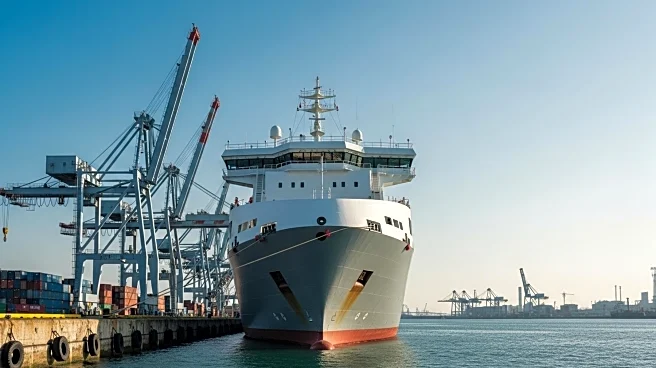What's Happening?
The Ukrainian Sea Ports Authority is utilizing financing from the World Bank to modernize its aging fleet, focusing on acquiring a multifunctional port vessel for operations in Izmail and on the Danube. The tender for the vessel includes capabilities for pollution cleanup, emergency rescues, firefighting, towing, and operations in ice conditions. This initiative is part of a broader effort to optimize fleet operations and reduce maintenance costs, which currently consume a significant portion of the budget. The modernization is crucial as ports along the Danube have become vital for Ukraine during the ongoing conflict, serving as key routes for fuel imports and grain shipments.
Why It's Important?
The modernization of Ukraine's port fleet is critical for maintaining logistical operations amid the ongoing conflict, especially given the attacks on ports in the Greater Odesa region. By enhancing the capabilities of its fleet, Ukraine aims to ensure the continued flow of essential goods and services, which is vital for the country's economy and war effort. The support from the World Bank underscores the international community's role in aiding Ukraine's infrastructure development during challenging times. This initiative may also set a precedent for other countries facing similar challenges, highlighting the importance of international cooperation in infrastructure development.
What's Next?
The Ukrainian Sea Ports Authority is reviewing proposals for the new vessel, with plans to finalize a contract and schedule delivery for 2026. This modernization effort is expected to strengthen operations and environmental focus across the Danube region. As the conflict continues, the ports will remain crucial for Ukraine's logistics and trade, potentially leading to further investments in infrastructure and fleet capabilities. The success of this initiative may encourage additional international support and investment in Ukraine's infrastructure, contributing to long-term economic stability.
Beyond the Headlines
The modernization of Ukraine's port fleet highlights the intersection of infrastructure development and geopolitical challenges. It raises questions about the role of international financial institutions in supporting countries during conflicts and the ethical considerations of such investments. The initiative also reflects the resilience and adaptability of Ukraine's logistics sector, which has had to navigate significant disruptions due to the war. This development may influence future policies on infrastructure investment in conflict zones, emphasizing the need for strategic planning and international collaboration.









